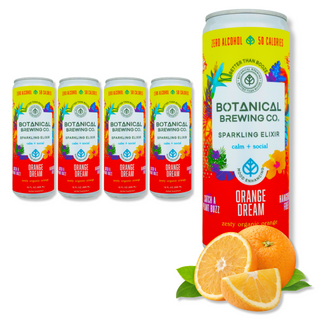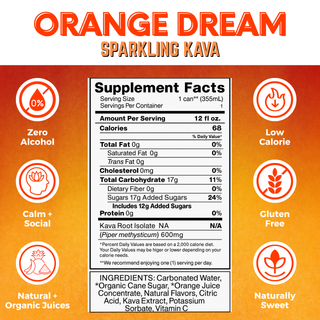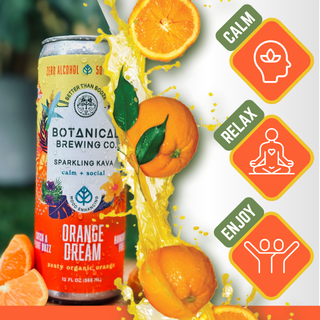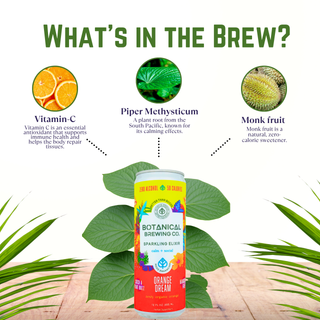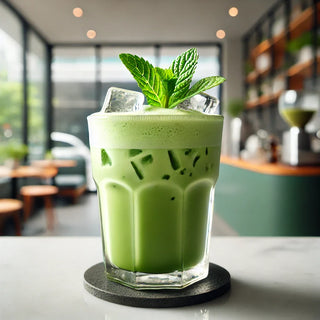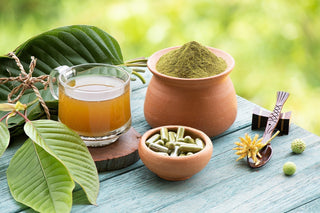In society, alcohol frequently takes center stage in social gatherings and relaxation routines, highlighting the urgent need for healthier alternatives. Our goal isn't to demonize alcohol but to illustrate how kava can be a highly effective substitute. Its natural properties make it a compelling option for those managing dependence while still desiring a pleasant and relaxing drink.
A common question arises: can kava help with alcohol withdrawal? The answer is yes. Kava provides calming effects without the addictive risks that come with alcohol.
By using kava to quit alcohol, individuals can enjoy relaxation and social interactions without the adverse health consequences. Kava promotes a healthier, more balanced lifestyle, enabling users to move away from alcohol while still enjoying social rituals.
Kava as an Alternative to Alcohol: the Benefits and Differences
When considering kava as an alternative to alcohol, it's important to understand both the similarities and the differences between these two beverages. While both kava and alcohol serve social and relaxing purposes, the impacts they have on health, addiction potential, and overall well-being are quite distinct.
Similarities Between Kava and Alcohol
-
Social Enjoyment
Both kava and alcohol have been used for centuries as social lubricants, helping people relax and engage in meaningful conversations. Whether it's a traditional kava ceremony in the South Pacific or a casual drink at a bar, these beverages play a central role in social gatherings, fostering a sense of camaraderie and connection. -
Calming Effects
The calming effects of kava are often compared to those of alcohol. The active compounds in kava, known as kavalactones, interact with the brain to produce a sense of relaxation similar to the initial stages of alcohol consumption. This makes kava an attractive option for those who seek the calming effects of alcohol without its negative side effects. -
Ritualistic Use
Cultural significance plays a big role in the consumption of both kava and alcohol. In many cultures, alcohol is used in various ceremonies and celebrations. Similarly, in the South Pacific, kava holds a significant place in traditional ceremonies and community gatherings, symbolizing peace and relaxation.
Differences Between Kava and Alcohol
-
Health Impact
One of the most significant differences when considering kava to replace alcohol is the impact on health. Alcohol consumption, particularly in excess, can lead to serious health issues such as liver disease, cardiovascular problems, and mental health disorders. Kava, on the other hand, does not impair cognitive function or motor skills and poses fewer health risks when consumed responsibly. In fact, kava can offer therapeutic benefits such as reduced anxiety and improved mood. -
Addiction Potential
The potential for addiction is another crucial factor. Alcohol has a high potential for addiction and dependence, which can lead to a range of social and personal issues. Kava, however, has a much lower risk of dependence, making it a safer option for regular consumption. This makes kava as alcohol replacement an appealing choice for those looking to reduce their alcohol intake without the risk of developing another addiction.
A significant advantage of kava over alcohol is the absence of hangovers. Alcohol consumption often results in unpleasant next-day effects, such as headaches, nausea, and fatigue. Kava allows users to enjoy its relaxing effects without these dreaded consequences, making it a more appealing option for those who need to remain productive and clear-headed.
When considering kava alcohol substitute, it's worth noting the natural origins of kava. Derived from the roots of the Piper methysticum plant, kava is a natural beverage free from artificial additives and preservatives. Alcohol production, on the other hand, often involves fermentation processes that can introduce various additives and impurities, which may contribute to its negative health effects.
Kava offers a range of potential health benefits that alcohol simply does not. Regular consumption of kava can lead to reduced anxiety, improved mood, and enhanced sleep quality. These therapeutic benefits make kava a good substitute for alcohol for individuals looking to improve their overall well-being without the negative side effects associated with alcohol.

Why Choose Kava as an Alcohol Alternative?
The decision to choose kava over alcohol offers numerous compelling benefits, especially for those seeking a healthier lifestyle. For individuals pondering is kava a good alternative to alcohol, the answer lies in its natural, low-risk, and therapeutic properties. Here are some key reasons to consider kava as alcohol replacement:
Health Benefits
One of the primary reasons people ask, is kava better for you than alcohol, is due to its significant health benefits. Kava promotes relaxation and reduces anxiety without the harmful side effects commonly associated with alcohol. Unlike alcohol, which can impair cognitive function and lead to long-term health issues, kava’s natural ingredients and therapeutic properties support overall well-being.
Lower Addiction Risk
When considering kava alcohol substitute, it’s crucial to note its lower potential for addiction. Alcohol carries a high risk of dependence, leading to a host of personal and social problems. In contrast, kava provides a safer option for regular consumption, offering a satisfying alternative without the danger of developing a dependence.
No Hangovers
One of the most appealing aspects of kava alternative to alcohol is the absence of hangovers. Kava allows users to enjoy its calming effects without the dreaded next-day headaches, nausea, or fatigue. This makes kava an ideal choice for those who need to maintain productivity and mental clarity.
Natural and Pure
Kava, derived from the roots of the Piper methysticum plant, is a clean and natural beverage. Our kava drinks are free from artificial additives and preservatives, ensuring a pure and wholesome experience. This contrasts sharply with many alcoholic beverages that undergo fermentation processes involving various additives and impurities.
Cultural Significance
Embracing kava means connecting with a drink rich in cultural heritage. Traditionally used in South Pacific ceremonies, kava brings a sense of tradition and ritual into modern lifestyles, offering a unique and meaningful drinking experience.
Therapeutic Properties
Regular consumption of kava can lead to reduced anxiety, improved mood, and enhanced sleep quality. These therapeutic benefits make kava an excellent choice for those looking to enhance their overall quality of life. By making the switch to kava, you can enjoy a relaxing beverage that supports your health and well-being in multiple ways.

Conclusion
Selecting kava as an alternative to alcohol provides many benefits for those aiming for a healthier and more balanced lifestyle.
At Botanical Brewing Co., we take pride in crafting high-quality drinks, recognized as the best kava to replace alcohol. Our delightful flavors, like the tropical "Kava Peach on the Beach" and the refreshing "Kava Orange Dream," offer a satisfying and beneficial alternative. Visit our website to find the perfect kava drink for your needs and begin your journey towards better health and well-being.



